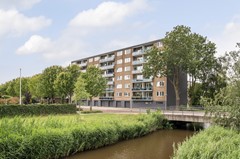FAQ
Veelgestelde vragen
Negotiations
Purchase
Banks apply strict rules for granting new mortgages. These are set out in the Mortgage Lending Code (Gedragscode Hypothecaire Financieringen - GHF) combined with ministerial regulations. What rules apply and how much can you borrow?
Besides income requirements, lenders also consider the ‘market value’ of the property. The lender determines this market value, which can be:
- The purchase price of the house
- The purchase/contract sum, possibly including land price, construction costs, additional work, construction interest, and utility connection costs
- The appraised value, possibly after renovation
For an existing home, in 2014 you could borrow a maximum of 104% of the market value (including renovation).
Since 2018, the maximum mortgage cannot exceed 100% of the market value. Therefore, from 2013 onwards, the maximum mortgage amount has been reduced in six equal steps of 1%. This means you will increasingly have to pay the additional costs yourself.
No. The highest court in the Netherlands, the Supreme Court (Hoge Raad), has ruled that the asking price of a house is an invitation to make an offer. If you offer the asking price from an advertisement or listing, you are making an offer. The seller can still decide whether to accept your offer, reject it, or have their broker make a counteroffer. The seller can even decide to raise the asking price during negotiations.No. The highest court, the Supreme Court has in fact ruled that the asking price of a property is an invitation to make an offer. If the asking price of an ad or property guide, then you do a bid. The seller can then decide whether to accept your offer or not, or that his broker a counter offer. He may even decide the asking price during the negotiations to increase.
This rarely happens in practice but is legally possible. Also, there is a requirement that the purchase agreement must be signed by both parties before the sale is final.
Costs for the buyer (k.k.) means that the buyer pays all costs related to the transfer of the purchased property. These costs amount to about 6% of the purchase price. They include:
- 2% transfer tax
- Notary fees for drafting the deed of transfer
- Land registry fees for registering the deed
- In addition, the buyer must also consider:
- Notary fees for drafting the mortgage deed
- Land registry fees for registering the mortgage deed
Broker fees are never included in the costs for the buyer. If a seller hires a broker to sell their house, the seller pays those fees. If a buyer hires a broker to assist with the purchase, the buyer pays those costs. Please keep this in mind when buying a house.
Also, in 2015 it was still possible to borrow up to 104% of the property value, so be aware of this when buying!
For any questions, you can of course contact our office!
Sale
Highlighted listings




